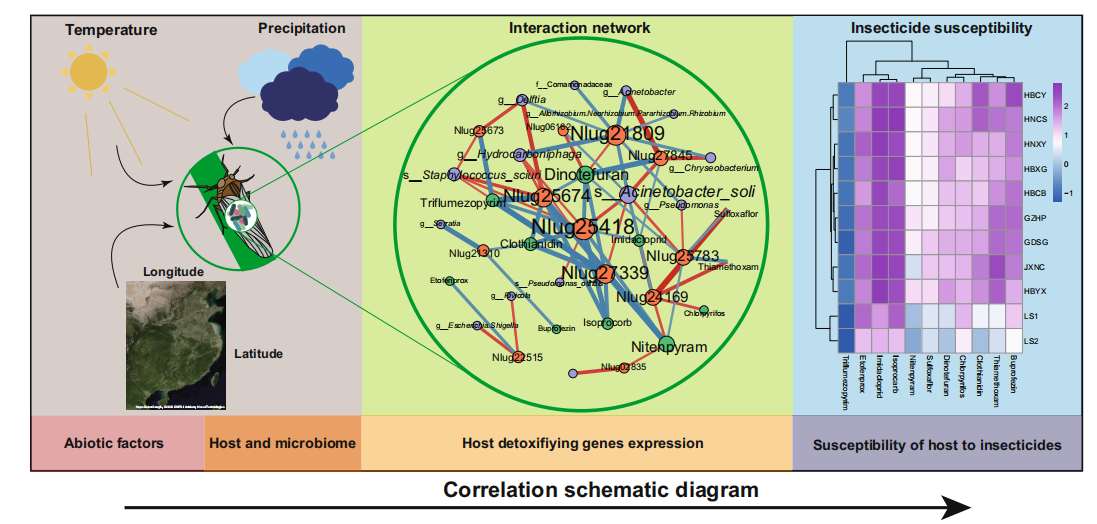南湖新闻网讯(通讯员 蔡廷卫)近日,我校植物科学技术学院农药毒理学及有害生物抗药性团队研究成果以“Microbiome variation correlates with the insecticide susceptibility in different geographic strains of a significant agricultural pest, Nilaparvata lugens ”为题在npj Biofilms and Microbiomes发表。
研究提出了“害虫抗药性微生物组”的概念,揭示了不同褐飞虱田间种群中微生物丰度及多样性与杀虫剂敏感性的联系,将害虫微生物组纳入害虫抗药性监测的范畴,鉴定了褐飞虱抗药性的重要微生物标记,研究结果深化了害虫抗药性的认识,亦有望为“靶菌治虫”策略的实施、害虫抗药性治理及新药创制提供新的策略和靶标。

非生物环境因子驱动的微生物组变异塑造了褐飞虱解毒基因表达模式进而影响宿主的杀虫剂抗药性变异
研究团队立足我国水稻绿色高质量安全生产的重大需求,紧紧围绕水稻重要害虫褐飞虱的抗药性问题开展系列研究。连续十年系统地开展褐飞虱抗药性监测,积累了宝贵的抗性基础数据与抗性资源;前期研究揭示了褐飞虱的共生细菌Wolbachia调控褐飞虱解毒代谢的分子机制(Zhang et al., 2021)。
然而,昆虫微生物组多样性如何在复杂田间环境下塑造褐飞虱杀虫剂抗药性尚不清楚。基于此,本研究通过广泛比较多个褐飞虱田间及实验室种群的微生物组组成、转录本表达水平和对不同杀虫剂的敏感性,提出了“抗药性微生物组”的概念,通过联合分析发现,褐飞虱核心细菌共生体的丰度与宿主抗药性相关解毒基因的表达显著相关,明确非生物环境因子驱动的褐飞虱田间种群微生物组多样性塑造了宿主解毒酶基因表达模式进而导致不同田间种群杀虫剂抗性变异。
该研究鉴定了多种褐飞虱核心共生菌作为其抗性水平的“Biomarker”,为今后田间抗性水平快速监测技术的开发提供了有力支撑,同时为气候变化背景下田间害虫对杀虫剂抗性的发展及治理策略制定提供了新视角。
植物科学技术学院已毕业博士张云骅和博士研究生蔡廷卫为该论文共同第一作者,万虎教授为论文通讯作者,李建洪教授、何顺副教授和佛罗里达大学Adam C. N. Wong助理教授参与了研究的指导,以上研究得到国家自然科学基金、国家重点研发计划等项目的资助。
审核人:李建洪
【英文摘要】
Microbiome-mediated insecticide resistance is an emerging phenomenon found in insect pests. However, microbiome composition can vary by host genotype and environmental factors, but how these variations may be associated with insecticide resistance phenotype remains unclear. In this study, we compared different field and laboratory strains of the brown planthopper Nilaparvata lugens in their microbiome composition, transcriptome, and insecticide resistance profiles to identify possible patterns of correlation. Our analysis reveals that the abundances of core bacterial symbionts are significantly correlated with the expression of several host detoxifying genes (especially NlCYP6ER1, a key gene previously shown involved in insecticides resistance). The expression levels of these detoxifying genes correlated with N. lugens insecticide susceptibility. Furthermore, we have identified several environmental abiotic factors, including temperature, precipitation, latitude, and longitude, as potential predictors of symbiont abundances associated with expression of key detoxifying genes, and correlated with insecticide susceptibility levels of N. lugens. These findings provide new insights into how microbiome-environment-host interactions may influence insecticide susceptibility, which will be helpful in guiding targeted microbial-based strategies for insecticide resistance management in the field.
论文链接:https://www.nature.com/articles/s41522-023-00369-5